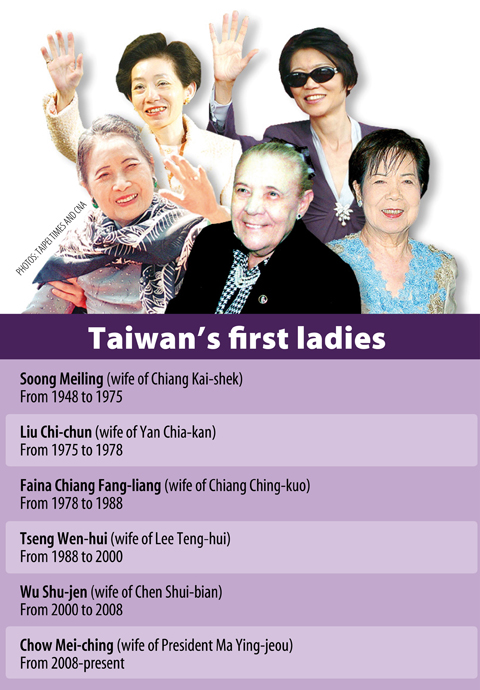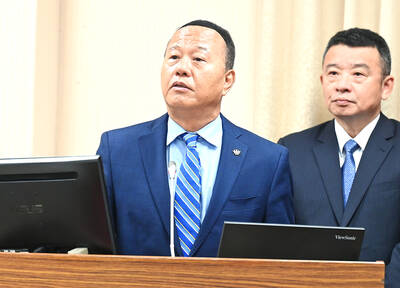In the US, the role of first lady is something of an institution. In Taiwan, however, there is little to compare with, in part because there have not been as many first ladies.
During the authoritarian regimes, first ladies held the role for a long time.
Soong Mayling (宋美齡), also known as Madame Chiang Kai-shek, was the Republic of China on Taiwan’s (ROC) first lady for 27 years.

Former dictator Chiang Kai-shek (蔣介石) became the president of the ROC in 1948 and he kept the position until his death in 1975. He stepped aside in 1949, but soon resumed power in 1950, one year after the Chinese Nationalist Party (KMT) lost the civil war in China and fled to Taiwan.
Dubbed “the most powerful and most beautiful woman in China,” Soong was most widely known at the time as a spokesperson for the Chinese cause against the invading Japanese Imperial Army between 1937 and 1945.
She was the first Chinese national and second woman to address both houses of the US Congress in 1943. Through the late 1960s she was included among the US’ 10 most admired women. Her international prominence won her the nickname of the “permanent first lady of China.”
Following Chiang Kai-shek’s death in 1975, then-vice president Yan Chia-kan (嚴家淦) was sworn in as president. During Yan’s three years in power, his wife Liu Chi-chun (劉期純) played the traditional role of a Chinese woman, that is, subdued and invisible.
Compared with her mother-in-law, Faina Chiang Fang-liang (蔣方良), the Russian-born wife of Chiang Kai-shek’s son Chiang Ching-kuo (蔣經國), was also a remarkably low-key figure during her husband’s 10 years in office.
She was not interested in politics and never made any public speeches.
Following the death of her husband in 1988 and subsequently those of her three sons, she cut all contact with the outside world.
Since the popular election of the country’s president in 1996 there have been three first ladies.
Tseng Wen-hui (曾文惠) — wife of the country’s first freely elected president Lee Teng-hui (李登輝), was like many women educated during the Japanese colonial era — quiet and virtuous.
She followed in the footstep of her predecessors and kept away from politics.
Former first lady Wu Shu-jen (吳淑珍) was more involved in state affairs at the beginning of then-president Chen Shui-bian’s (陳水扁) first term and conducted trips overseas and accepted international awards on behalf of her husband.
A former legislator, the wheelchair-bound Wu charmed the public with her straightforward attitude and was considered a political asset when Chen was elected in 2000.
However, following her indictment on corruption and forgery charges, she was seen as a liability and questions were raised about her place in government affairs, with some criticizing her for having too much influence on policy.
First lady Chow Mei-ching (周美青) has remained fairly low-key since President Ma Ying-jeou (馬英九) took office in May 2008. Chow also maintained a low profile when Ma was mayor of Taipei.
The role of first lady can be seen as a strange position. It is not an elected public office, but the public expects the person in the role to perform certain duties. So what is a Taiwanese first lady supposed to do?
Hawang Shiow-duan (黃秀端), a professor of political science at Soochow University, said it would be good for the country if whoever is first lady took her role seriously and had a pro-active approach.
Chow could show some more enthusiasm for her role, she said, but it had a lot to do with her personality.
Ping Lu (平路), a social critic and columnist, said although the public did not elect the first lady, the position still represented a certain social status.
As there are not many models to follow, Lu said the first lady’s personal wishes must be taken into account when it comes to her duties.
If the person is truly interested in doing something for the country, Lu said, she can create her own functions according to her interests.
Lu cited Soong as an example, who established the National Women’s League of the ROC to help fight communism and the Soviet Union.
As long as the organization operates in a transparent fashion, the public will accept it, Lu said.
Yao Jen-to (姚人多), an assistant professor of sociology at National Tsing Hua University, however said he did not think the first lady should play a more pro-active role.
“I don’t have any problem seeing a first lady who is just being herself,” he said. “For those who think the first lady should be more involved are those who think women should help their husband in their career.”
Yao said he believed if the country had a female president, not many people would expect her husband to play a more active role.
Analysts were also divided over whether the position of first lady should become more institutionalized.
Hawang said even if the first lady is not assigned office space, she must have a staff to take care of her daily business.
“She is, after all, the spouse of the president,” she said. “She represents the country and has state dinners to attend or overseas trips to make.”
Lu said she was doubtful about institutionalizing the position. If a first lady can do her job well without an office, Lu said she does not see the need of burdening her with it.
Yao said if the public expected the first lady to play a role, it was imperative to institutionalize the position so the powers and responsibilities are clearly stipulated.
Until that happens, the public has no right to demand that the first lady play a more visible and significant role as she was thrust into the role by her spouse, he said.
It would only show the country’s democratic politics were immature if the public does otherwise, he said.

VIGILANCE: The military is paying close attention to actions that might damage peace and stability in the region, the deputy minister of national defense said The People’s Republic of China (PRC) might consider initiating a hack on Taiwanese networks on May 20, the day of the inauguration ceremony of president-elect William Lai (賴清德), sources familiar with cross-strait issues said. While US Secretary of State Anthony Blinken’s statement of the US expectation “that all sides will conduct themselves with restraint and prudence in the period ahead” would prevent military actions by China, Beijing could still try to sabotage Taiwan’s inauguration ceremony, the source said. China might gain access to the video screens outside of the Presidential Office Building and display embarrassing messages from Beijing, such as congratulating Lai

REPORT: Taipei has expressed an interest in obtaining loitering munitions matching the AeroVironment Switchblade 300 or the Anduril Altius-600, ‘Foreign Policy’ said Taiwan is seeking US-made kamikaze drones in an apparent concession to pressure from Washington to focus on asymmetric capabilities to defeat or deter a Chinese attack, Foreign Policy said in a report on Wednesday. Taipei has expressed an interest in obtaining AeroVironment Switchblade loitering munitions or other devices with similar capabilities, it said, citing four sources familiar with the matter commenting on condition of anonymity. The Switchblade 300 is a tube-launched drone designed for attacking ground troops, while its larger sibling, the Switchblade 600, could be used to destroy tanks and entrenched troops. Ukraine has utilized both systems extensively in its fight against

Police officers yesterday morning apprehended the prime suspect of a triple homicide case, after raiding the suspect’s hideout in Taichung. They transported the suspect to New Taipei City for questioning and recorded his statement last night. The suspect, identified as a 24-year-old man surnamed Chang (張), is believed to have used his hands to strangle his wife, surnamed Chen (陳), 29, along with his three-year-old son from a previous marriage and his wife’s mother, 69. The three dead bodies were wrapped in blankets when they were discovered inside their apartment in New Taipei City’s Sanchong District (三重) on Saturday. Chang was holding a

STRIKING A BALANCE: A nutritionist said that only 9 percent of respondents were concerned whether they had a sufficient balance of vegetables and fruits Nearly 60 percent of respondents said that they are affected physically and mentally due to lack of a regular breakfast routine, while only 9 percent ate a balanced diet, a Formosa Cancer Foundation survey showed. Thirty percent of respondents do not eat breakfast at home, saying it is more expedient to buy it, said Hsu Kuei-ting (徐桂婷), the foundation’s nutritionist, citing its most recent poll on nutritional intake for people aged 20 to 60. The poll showed that 60 percent believe they do not eat breakfasts that have balanced nutrition. At 62 percent, convenience was the most commonly cited factor in deciding whether